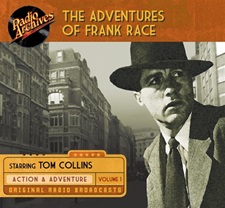
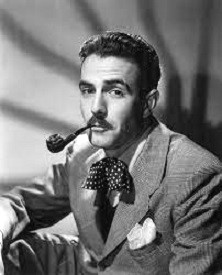 “Before the war, Frank Race worked as an attorney,
“Before the war, Frank Race worked as an attorney,
but he traded his law books for the cloak-and-dagger of the OSS.
When the war was over, his former life was over, too . . .
adventure had become his business!”
The Adventures of Frank Race (1949-50) aired “The Adventure of the Reckless Daughter” on July 10, 1949, as the 11th of its 43 episodes. Original air dates for this program are impossible to pin down with 100% accuracy due to the fact that it was not sold to one of the four major national radio networks who would air the shows at a set day and time nationwide, but was syndicated to individual stations across the country who would broadcast episodes at whatever dates suited their local programming. This is only the fifth episode featuring Frank Race’s adventures we have run, the first coming on December 10, 2022, the second on May 20th of 2023, the third coming on November 25th, 2023, and the last coming just over a year ago in September of 2024. As such, a recap of the introductory background material provided in that initial episode is below, for newcomers to the show or for those needing to refresh their memories.
The italicized opening at the top of this page is the host’s introduction to each episode. The premise of a private investigator with a government background such as the O.S.S. (Office of Strategic Services, forerunner to our C.I. A.) was not new. Radio had a number of programs prior to Frank Race when espionage was still in the minds of the public following World War II, among them Secret Agent K-7 (1939), The Man Called X (1944), Dangerous Assignment (debuting in 1949), and also debuting in 1949 was Richard Diamond, Private Detective who had a background which included the O.S.S.. The Adventures of Frank Race has been characterized as a combination of Johnny Dollar and James Bond. Johnny Dollar in that Race also investigates (as his cover) for an insurance firm, and James Bond due to the women, intelligent, beautiful and honest (well some of them)—as well as some not so trustworthy, with whom he has encounters. While Race obviously has “cases” due to his work for the insurance company, they are designed more as world-traveling adventures, thus the title of the show.
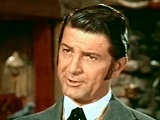 Tom Collins (1913-1973, photo top right) starred as Frank Race for the show’s first 22 episodes. Collins was well known to radio fans as the voice of Chandu in the 1948 run of Chandu the Magician. Beginning with episode 23, Collins would pass the torch to versatile and talented radio actor Paul Dubov (1918-1979, photo at right), and nary a beat was missed. From 1938-1977 Dubov appeared in many film and/or TV shows, a few among them being Day the World Ended (1955), The She Creature (1956), Voodoo Woman (1957), and The Underwater City (1962) for film, and Wanted, Dead or Alive (1960) and Bat Masterson (1961) for TV. Though the title role was split evenly between Collins and
Tom Collins (1913-1973, photo top right) starred as Frank Race for the show’s first 22 episodes. Collins was well known to radio fans as the voice of Chandu in the 1948 run of Chandu the Magician. Beginning with episode 23, Collins would pass the torch to versatile and talented radio actor Paul Dubov (1918-1979, photo at right), and nary a beat was missed. From 1938-1977 Dubov appeared in many film and/or TV shows, a few among them being Day the World Ended (1955), The She Creature (1956), Voodoo Woman (1957), and The Underwater City (1962) for film, and Wanted, Dead or Alive (1960) and Bat Masterson (1961) for TV. Though the title role was split evenly between Collins and 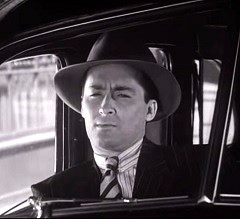 Dubov during the show’s run, Race’s sometimes valet/cab driver/associate and “sidekick” if you will, was Marc Donovan, played perfectly throughout all 43 episodes by Tony Barrett (1916-1974, photo at left as the character Melody Fiske, a piano playing thug in the 1947 film Dick Tracy Meets Gruesome, featuring Boris Karloff), another of radio and TV’s most versatile actors, writers, and even producers. Two of his several TV credits include being one of the writers for the popular detective program Peter Gunn (1958) and one of the primary developers of The Mod Squad (1968). A few of the supporting actors appearing in episodes during the show’s run were many of radio’s finest, including Gerald Mohr, Frank Lovejoy, Lurene Tuttle, Virginia Gregg, and Parley Bear.
Dubov during the show’s run, Race’s sometimes valet/cab driver/associate and “sidekick” if you will, was Marc Donovan, played perfectly throughout all 43 episodes by Tony Barrett (1916-1974, photo at left as the character Melody Fiske, a piano playing thug in the 1947 film Dick Tracy Meets Gruesome, featuring Boris Karloff), another of radio and TV’s most versatile actors, writers, and even producers. Two of his several TV credits include being one of the writers for the popular detective program Peter Gunn (1958) and one of the primary developers of The Mod Squad (1968). A few of the supporting actors appearing in episodes during the show’s run were many of radio’s finest, including Gerald Mohr, Frank Lovejoy, Lurene Tuttle, Virginia Gregg, and Parley Bear.
This episode finds Frank Race in an unnamed European country in 1948, three years after WWII, during a time of reconstruction where the local people are trying to reestablish and rebuild their lives, while others jockey for power in a weakened, vulnerable country. In his cover story as an insurance investigator, Frank Race is sent to this unnamed European country to assess the safety of insuring certain businesses trying to rebuild, during a time when lawlessness and disorder were more the rule than the exception. Race’s investigations find him unceremoniously involved with politics early on, with the attempted assassination of a politician’s daughter embroiling him at the center of an adventure far larger than his routine day job promised. Set at a time, and with a story angle not often considered with post-WWII stories in book or film, “The Adventure of the Reckless Daughter” is worth a listen.
(The linked CD at the top includes this episode and 19 others, all digitally remastered and restored.)
Play Time: 26:32
{This episode of Frank Race aired on a Sunday in early July of 1949. Despite its being involved in international intrigue, the neighborhood gang was all of a sudden into the western genre, thanks to the parents of one of their number having just purchased an early model of something called a television set. One of the very early programs debuting in June of 1949 was Hopalong Cassidy, which the gang took to like ducks to water. The first “Hoppy” episodes were excerpted from his highly popular 1930s and 1940s short films, but soon enough there would be brand new Hopalong Cassidy episodes made for TV. So this time when the gang hit the nearby newsstand they were interested in more western stories, inspired by the movie and now TV tales of William Boyd as Hopalong Cassidy. Big-Book Western (1933-54) was one of the longest running western pulps, providing (as the cover promised) 4 complete novels in each issue. That offer was hard to turn down. 1949 saw its first 4 issues as a monthly, but with its last 4 issues it transitioned to a bimonthly for a total of 8 issues in 1949. Mammoth Western (1945-51) appeared near the last days of the popularity of the western pulps, but for half its short run, including 1949, it was a solid monthly publication for diehard western fans. Three Western Novels (1948-50) had no set schedule in its brief 3-year run, managing only 11 issues in total, with 4 bimonthly issues in 1949, despite the fact that it offered several complete novels much like its competitor, Big-Book Western.}
[Left: Big-Book Western, 6/49 – Center: Mammoth Western, 7/49 – Right:Three Western Novels, 7/49)
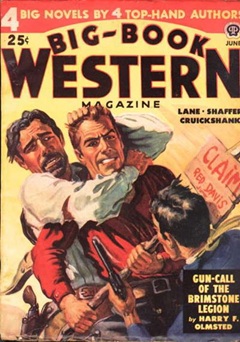
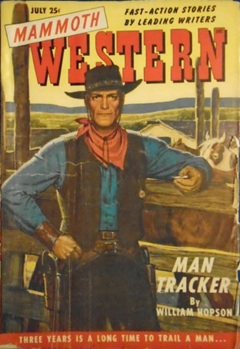
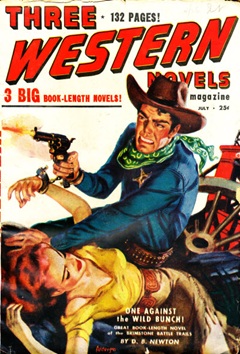
To view the entire list of weekly Old Time Radio episodes at Tangent Online, click here.